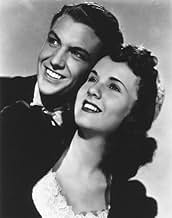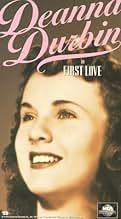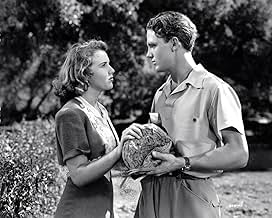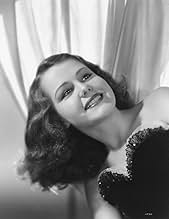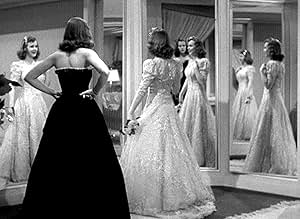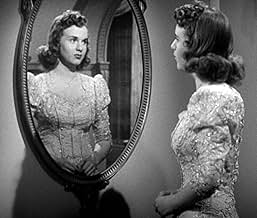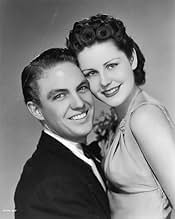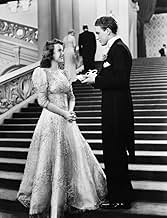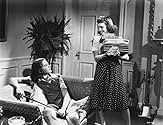VALUTAZIONE IMDb
7,0/10
825
LA TUA VALUTAZIONE
Aggiungi una trama nella tua linguaAn orphaned boarding school graduate secretly attends a prestigious ball, where she falls for the boyfriend of her snobbish cousin.An orphaned boarding school graduate secretly attends a prestigious ball, where she falls for the boyfriend of her snobbish cousin.An orphaned boarding school graduate secretly attends a prestigious ball, where she falls for the boyfriend of her snobbish cousin.
- Regia
- Sceneggiatura
- Star
- Candidato a 2 Oscar
- 4 vittorie e 2 candidature totali
Recensioni in evidenza
This 1939 take on 'Cinderella' works like a charm, and I honestly would never have guessed as much. I found myself being continuously bewitched by it, its sincerely touching and funny script and dialogue, the wealth of small character parts from the laconic spinster teacher ("Old maids are only happy when they cry, you'll find out") and the personable servants to the zany rich family that Durbin's orphan girl has to stand up to.
And of course, over and above everything else, there is Deanna Durbin, a full-fledged young leading lady with a miraculous voice and loads of screen presence and pathos (listen to her sing 'Un bel dì' from 'Madame Butterfly' at the end!). Blonde hunk Robert Stack has his first part ever as the Prince Charming who is left with the empty slipper, but only after a gorgeous series of incredibly romantic encounters.
And of course, over and above everything else, there is Deanna Durbin, a full-fledged young leading lady with a miraculous voice and loads of screen presence and pathos (listen to her sing 'Un bel dì' from 'Madame Butterfly' at the end!). Blonde hunk Robert Stack has his first part ever as the Prince Charming who is left with the empty slipper, but only after a gorgeous series of incredibly romantic encounters.
"First Love" was a major transition for Universal star Deanna Durbin, as she was being positioned to shift from child star to engenue (something that Fox was inevitably unable to accomplish with Shirley Temple at the same time). While the film is not an overblown epic, it's lavish in the details, and carefully produced to give the whole piece a maximum of charm. To today's audiences, it might be a bit saccharine, but if you can dial down the cynicism of our age, the film's positive points grow.
Durbin plays much more subtly in this film than she had in many of her earlier films--signalling that she was now "maturer" instead of being a juvenile whirlwind ball of energy like she had been in "Three Smart Girls" and "100 Men and a Girl." Her beau, played by an impossibly young (and almost scarily good looking) Robert Stack, gives Durbin her first screen kiss--a source of major publicity for the film at the time.
The story is an updated Cinderella/screwball comedy, which nevertheless allows Durbin's character to break out into a few operatic arias throughout the film (this also takes some getting used to for modern audiences). The most memorable part of the film, suitably, happens during "the ball," where Durbin and Stack dance for the first time. Employing a charming idea, a shot of a crowded dance floor dissolves to a shot of just the duo dancing, to imply how the pair are so involved with each other that the rest of the world has faded away. If you like stuff like this, then you'll revel in the rest of the film.
Durbin plays much more subtly in this film than she had in many of her earlier films--signalling that she was now "maturer" instead of being a juvenile whirlwind ball of energy like she had been in "Three Smart Girls" and "100 Men and a Girl." Her beau, played by an impossibly young (and almost scarily good looking) Robert Stack, gives Durbin her first screen kiss--a source of major publicity for the film at the time.
The story is an updated Cinderella/screwball comedy, which nevertheless allows Durbin's character to break out into a few operatic arias throughout the film (this also takes some getting used to for modern audiences). The most memorable part of the film, suitably, happens during "the ball," where Durbin and Stack dance for the first time. Employing a charming idea, a shot of a crowded dance floor dissolves to a shot of just the duo dancing, to imply how the pair are so involved with each other that the rest of the world has faded away. If you like stuff like this, then you'll revel in the rest of the film.
"First Love" is a delightful 20th century Cinderella story, with good songs by Deanna Durbin and some light comedy. The film was nominated for three Academy Awards. Since most people know the Cinderella plot, a lot more need not be said. Except that a very good supporting cast does justice to a good screenplay in this modern adaptation of the story.
Durbin is Constance Harding in the Cinderella role. The prince role is Ted Drake, played by Robert Stack. There isn't a fairy godmother, a pumpkin or adaptable mice. But this Cinderella has relatives with a house and servants who take to her. And, a somewhat beleaguered and withdrawn Uncle James Clinton (played by Eugene Pallette), who eventually comes to life thanks to Constance.
When she is rejected by her cousins, Constance returns to the orphanage where she was raised. She had known family there, among all the other girls, the teachers and the director, Miss Wiggins (played by Kathleen Howard). She says she will stay there and become a teacher also. But she gets some sage counseling from Miss Wiggins.
Miss Wiggins, "Do you like cats?" Constance Harding, "No, not much." Miss Wiggins, "Huh! You'll get to love them. They've got sense. They're like men. Feed them, pet them, and admire them, and they'll purr. Every woman wants to make somebody purr. You want to lock yourself up in a world of women."
Constance notices the ladies of the faculty with tears on their faces listening to her sing a beautiful aria. She later asks Miss Wiggins about it. Wiggins says, "Old maids ore only happy when they cry. You'll find that out."
But, just as in the fairy tale, the prince charming in this film finds his Cinderella. And Ted Drake sees to it that Constance won't be among the spinster faculty at the orphanage. It's an entertaining film that the whole family should enjoy.
Durbin is Constance Harding in the Cinderella role. The prince role is Ted Drake, played by Robert Stack. There isn't a fairy godmother, a pumpkin or adaptable mice. But this Cinderella has relatives with a house and servants who take to her. And, a somewhat beleaguered and withdrawn Uncle James Clinton (played by Eugene Pallette), who eventually comes to life thanks to Constance.
When she is rejected by her cousins, Constance returns to the orphanage where she was raised. She had known family there, among all the other girls, the teachers and the director, Miss Wiggins (played by Kathleen Howard). She says she will stay there and become a teacher also. But she gets some sage counseling from Miss Wiggins.
Miss Wiggins, "Do you like cats?" Constance Harding, "No, not much." Miss Wiggins, "Huh! You'll get to love them. They've got sense. They're like men. Feed them, pet them, and admire them, and they'll purr. Every woman wants to make somebody purr. You want to lock yourself up in a world of women."
Constance notices the ladies of the faculty with tears on their faces listening to her sing a beautiful aria. She later asks Miss Wiggins about it. Wiggins says, "Old maids ore only happy when they cry. You'll find that out."
But, just as in the fairy tale, the prince charming in this film finds his Cinderella. And Ted Drake sees to it that Constance won't be among the spinster faculty at the orphanage. It's an entertaining film that the whole family should enjoy.
Young Deanna Durbin goes to live with her uncle Eugene Palette and a group of snooty society cousins in this film. They treat her like a country cousin and snub her generally including her aunt by marriage. But little do they know that Deanna is destined to find her First Love in this story reworked from the Cinderella fairy tale.
After three years Deanna was growing up on screen and the folks at Universal Pictures decided she ought to have her first screen kiss. The one tapped for the honor was a guy making his screen debut Robert Stack.
The one who really treats her rotten is her débutante cousin Helen Parrish and her equally snobby friend June Storey. Deanna is not treated any better than one of the staff at her house, like Cinderella she might as well be relegated to being a chimney sweep.
Stack is the guy that Parrish and Storey have set their caps for, he's another society kid. But he likes simple and unaffected Deanna who ironically Parrish sets up the meeting between them. That's a rather funny scene.
Some good songs for Durbin highlighted the classic There's No Place Like Home, Amapola, and Un Bel Di from Madame Butterfly. And of course one of the most publicized kisses ever in screen history.
First Love brought home Oscar nominations for Sound, Art&Set Decoration, and Musical Scoring for Universal Pictures. Little Miss Fix-It was definitely growing up and her future roles would show a maturing Durbin for the movie-going public. It still is fine entertainment.
After three years Deanna was growing up on screen and the folks at Universal Pictures decided she ought to have her first screen kiss. The one tapped for the honor was a guy making his screen debut Robert Stack.
The one who really treats her rotten is her débutante cousin Helen Parrish and her equally snobby friend June Storey. Deanna is not treated any better than one of the staff at her house, like Cinderella she might as well be relegated to being a chimney sweep.
Stack is the guy that Parrish and Storey have set their caps for, he's another society kid. But he likes simple and unaffected Deanna who ironically Parrish sets up the meeting between them. That's a rather funny scene.
Some good songs for Durbin highlighted the classic There's No Place Like Home, Amapola, and Un Bel Di from Madame Butterfly. And of course one of the most publicized kisses ever in screen history.
First Love brought home Oscar nominations for Sound, Art&Set Decoration, and Musical Scoring for Universal Pictures. Little Miss Fix-It was definitely growing up and her future roles would show a maturing Durbin for the movie-going public. It still is fine entertainment.
I'll take my Cinderella with Prokovief, but after watching First Love, a first-rate film with a quease-inducing title, I'll place this Deanna Durbin vehicle second.
"You go up there to New York," says Miss Wiggins, a crotchety, spinster music teacher, to Connie Harding, who has just graduated from a fancy private school. "Make those people love you just as much as we do." Connie is an orphan, and Miss Wiggins is referring to her uncle and his family, wealthy New Yorkers who have paid all her bills but were just too busy to drive down for her graduation. They sent one of the family's limousines for her. "And then," Miss Wiggins says, "maybe, someday, you will meet a prince, and you'll live happily ever after."
"Those fairy stories haven't come true for over 100 years, Miss Wiggins," Connie says.
Miss Wiggins thumps the floor with her cane. "Fiddlesticks! We just have to dust them off...streamline them a bit."
And this is what director Henry Koster, one of the best of Durbin's directors, has managed to do. He is aided immeasurably by a clever script ("This is terrible," says Barbara, Connie's awful cousin, "I can't be more than an hour and a half late to Wilma's party...she's one of my personal friends!") and solid, pungent performances by some very good character actors. The story's sweetness is genuine, based on the intrinsic sympathy for a young girl who manages to overcome obstacles with the help of others, and then finds happiness. Deanna Durbin at 18 is an intriguing combination of naturalness and skill. We like her the moment we see her, and her ability to win us over is enhanced when we meet the family. Her uncle (Eugene Palette) is a gruff man who seemingly only wants to keep far away from his wife and children, as well as away from Connie. When we meet the rest of the family, we sympathize with him. His wife (Leatrice Joy) is unpleasantly scatter-brained. His daughter (Helen Parish), a year older than Connie, is a snobbish, selfish, manipulating terror. His son (Lewis Howard) is so languid he make laziness seem tiring.
There's a lavish ball, and Connie gets to go thanks to the intervention of the servants, led by that great butler-playing specialist, Charles Coleman. She meets a prince of a wealthy young man, Ted Drake (whom she met once before with mud on her face). When they waltz at the ball, all the other dancers fade away in a clever bit of instant love setting by Koster. Then Durbin receives her first screen kiss, from Robert Stack as Ted, as naturally as she acts. After the usual ups and downs for Cinderella, there's a happy ending which involves a matching slipper. Her uncle becomes the worm who turns, dealing brisk and satisfying retribution to his family, and even Miss Wiggins smiles. We are assured that Connie and Ted live happily ever after.
Durbin sings two or three songs, including the hoary old tear-jerker "There's No Place Like Home." More impressively, she sings "Un Bel Di." Impressively, because not many 18-year- olds I've heard of would be able to handle the emotions Puccini lays on with such a trowel. The aria is a tear-jerker, too, but a great one. It takes a singer who knows what she's doing to handle the emotions (in Italian) as well as the notes. Durbin carries it off impressively with her usual uncanny poise.
First Love, except for that title, is completely and satisfyingly charming.
"You go up there to New York," says Miss Wiggins, a crotchety, spinster music teacher, to Connie Harding, who has just graduated from a fancy private school. "Make those people love you just as much as we do." Connie is an orphan, and Miss Wiggins is referring to her uncle and his family, wealthy New Yorkers who have paid all her bills but were just too busy to drive down for her graduation. They sent one of the family's limousines for her. "And then," Miss Wiggins says, "maybe, someday, you will meet a prince, and you'll live happily ever after."
"Those fairy stories haven't come true for over 100 years, Miss Wiggins," Connie says.
Miss Wiggins thumps the floor with her cane. "Fiddlesticks! We just have to dust them off...streamline them a bit."
And this is what director Henry Koster, one of the best of Durbin's directors, has managed to do. He is aided immeasurably by a clever script ("This is terrible," says Barbara, Connie's awful cousin, "I can't be more than an hour and a half late to Wilma's party...she's one of my personal friends!") and solid, pungent performances by some very good character actors. The story's sweetness is genuine, based on the intrinsic sympathy for a young girl who manages to overcome obstacles with the help of others, and then finds happiness. Deanna Durbin at 18 is an intriguing combination of naturalness and skill. We like her the moment we see her, and her ability to win us over is enhanced when we meet the family. Her uncle (Eugene Palette) is a gruff man who seemingly only wants to keep far away from his wife and children, as well as away from Connie. When we meet the rest of the family, we sympathize with him. His wife (Leatrice Joy) is unpleasantly scatter-brained. His daughter (Helen Parish), a year older than Connie, is a snobbish, selfish, manipulating terror. His son (Lewis Howard) is so languid he make laziness seem tiring.
There's a lavish ball, and Connie gets to go thanks to the intervention of the servants, led by that great butler-playing specialist, Charles Coleman. She meets a prince of a wealthy young man, Ted Drake (whom she met once before with mud on her face). When they waltz at the ball, all the other dancers fade away in a clever bit of instant love setting by Koster. Then Durbin receives her first screen kiss, from Robert Stack as Ted, as naturally as she acts. After the usual ups and downs for Cinderella, there's a happy ending which involves a matching slipper. Her uncle becomes the worm who turns, dealing brisk and satisfying retribution to his family, and even Miss Wiggins smiles. We are assured that Connie and Ted live happily ever after.
Durbin sings two or three songs, including the hoary old tear-jerker "There's No Place Like Home." More impressively, she sings "Un Bel Di." Impressively, because not many 18-year- olds I've heard of would be able to handle the emotions Puccini lays on with such a trowel. The aria is a tear-jerker, too, but a great one. It takes a singer who knows what she's doing to handle the emotions (in Italian) as well as the notes. Durbin carries it off impressively with her usual uncanny poise.
First Love, except for that title, is completely and satisfyingly charming.
Lo sapevi?
- QuizDeanna Durbin's character gives her birthdate as 4 December - Durbin's own.
- BlooperThe movement of Deanna during the scene with her mirror.
- Citazioni
Miss Wiggins: The trouble with you young people is you don't believe in anything. You're afraid, afraid of hope, afraid of happiness.
- ConnessioniFeatured in Tua per sempre (1943)
I più visti
Accedi per valutare e creare un elenco di titoli salvati per ottenere consigli personalizzati
- How long is First Love?Powered by Alexa
Dettagli
- Tempo di esecuzione
- 1h 24min(84 min)
- Colore
- Proporzioni
- 1.37 : 1
Contribuisci a questa pagina
Suggerisci una modifica o aggiungi i contenuti mancanti

